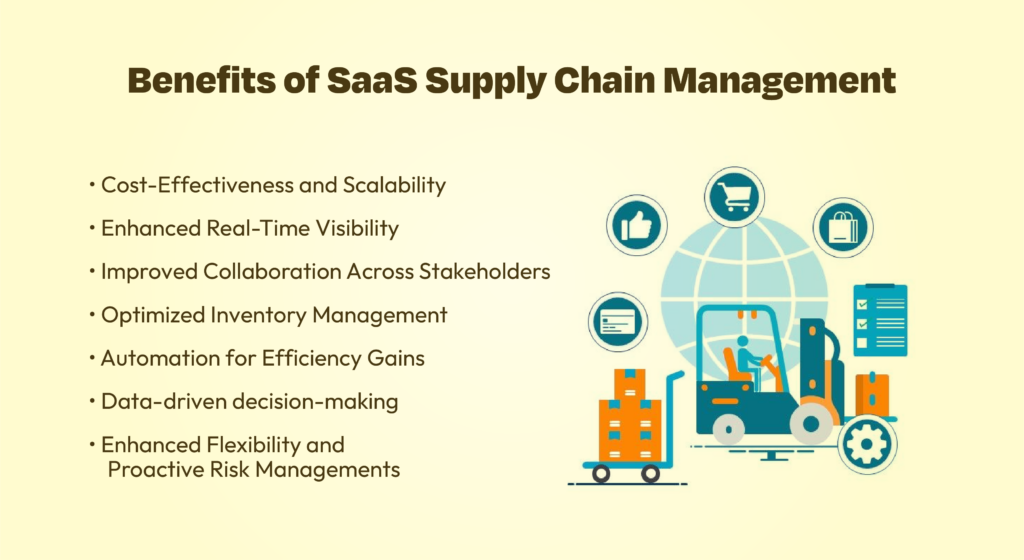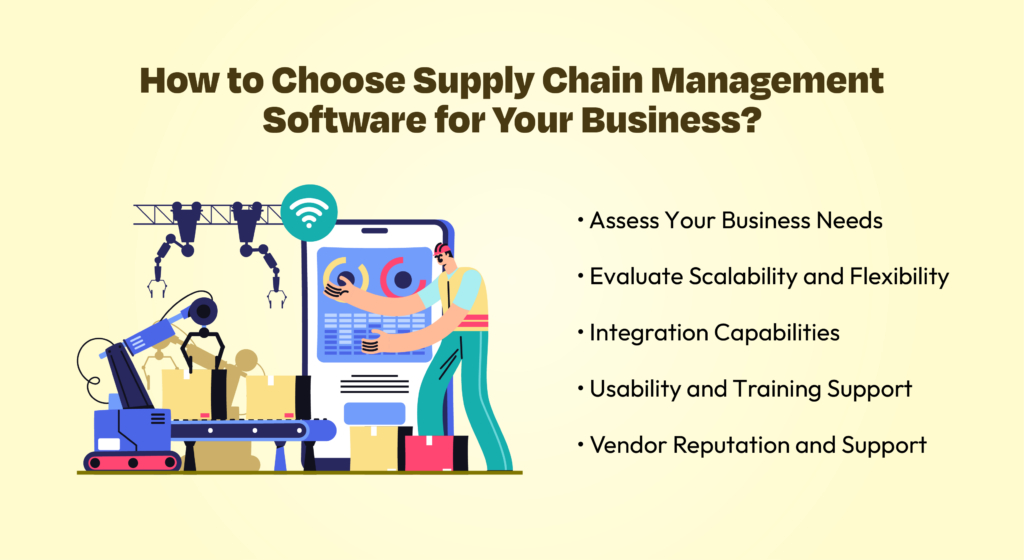Key Highlights
- SaaS solutions are transforming supply chain management, offering real-time visibility, improved efficiency, and reduced costs.
- Leading businesses are adopting SaaS supply chain management software to gain a competitive advantage in today’s dynamic market.
- This blog explores the benefits of SaaS in supply chain operations, and the future of the market, and highlights top supply chain SaaS companies.
- From inventory management to demand planning, various facets of the supply chain are being revolutionized through SaaS applications.
- Discover how SaaS enhances collaboration, streamlines processes, and fosters sustainable growth by building a more resilient network.
Supply chain management (SCM) is essential for businesses to maintain a seamless flow of goods and services from suppliers to customers. And, SaaS supply chain management solutions further support and enhance SCM through cloud-based solutions.
With appropriate supply chain SaaS, businesses can streamline operations, enhance efficiency, reduce costs, and significantly boost customer satisfaction.
With global trade expanding, 79% of companies focus on improving their supply chain performance to meet rising consumer demands.
The global SaaS market in supply chain management is expected to grow at a CAGR of 21.2%, reaching $43.2 billion by 2027.
We’ll explore how SaaS reshapes supply chain management, highlighting its benefits and challenges, and how businesses can adopt these technologies.
What is SaaS in Supply Chain Management?
SaaS in supply chain management is a cloud-based software solution that enables businesses to manage and improve their supply chain operations online.
Unlike traditional SCM software, which demands costly hardware and maintenance, SaaS eliminates upfront infrastructure investments, offering businesses flexible, cost-efficient, and remote access to manage their supply chains.
The shift toward cloud-based supply chain solutions has transformed the industry by providing real-time data insights and advanced analytics, leading to optimized business processes like procurement, inventory, logistics, and delivery.
For example, a retailer using SaaS can track inventory in real-time and quickly redirect stock to meet unexpected surges in demand, preventing out of stocks, minimizing excess inventory costs, and ensuring timely deliveries.

Benefits of SaaS in Supply Chain Management
Businesses opt for SaaS in supply chain management with a cost-saving motive. SaaS increases supply chain efficiency with automation, real-time data insights, and better stakeholder teamwork.
Here are the key benefits of using SaaS for supply chain management.
1. Cost-Effectiveness and Scalability
SaaS operates on a subscription-based model, eliminating the high upfront costs associated with traditional software, such as hardware installation and IT maintenance.
This makes advanced supply chain tools accessible to businesses of all sizes.
Additionally, SaaS solutions scale easily to meet growing business needs, allowing companies to add features or users without significant investments.
2. Enhanced Real-Time Visibility
With SaaS, businesses gain real-time visibility into every stage of the supply chain, from procurement to delivery.
Companies can track shipments globally, monitor inventory levels across multiple locations, and identify potential disruptions early.
This transparency reduces lead times, minimizes stockouts, and improves operational efficiency.
3. Improved Collaboration Across Stakeholders
SaaS platforms provide a centralized hub for communication and data sharing, fostering better collaboration among suppliers, manufacturers, distributors, and retailers.
Real-time data access ensures all stakeholders are on the same page, reducing miscommunications and enabling faster, more informed decision-making.
4. Optimized Inventory Management
SaaS consolidates inventory data from multiple channels into a single platform, offering a comprehensive view of stock levels across warehouses, retail stores, and online marketplaces.
Features like automated stock replenishment, demand forecasting, and optimized order fulfillment allow businesses to maintain ideal inventory levels, and reduce carrying costs.
5. Automation for Efficiency Gains
SaaS solutions free up valuable time for supply chain teams by automating routine processes like inventory tracking, order processing, and purchase order creation.
Moreover, automation reduces human error, speeds up operations, and allows businesses to focus on strategic decision-making.
6. Data-driven decision-making
SaaS solutions leverage advanced data analytics to aggregate and analyze information from various sources, such as sales trends, market demand, and external factors like weather or economic shifts.
These insights enable businesses to forecast demand accurately, identify inefficiencies, and optimize supply chain operations, leading to better performance and cost savings.
8. Enhanced Flexibility and Proactive Risk Management
SaaS solutions empower businesses to manage their supply chain operations remotely from anywhere, offering greater flexibility.
Moreover, real-time data from SaaS tools help identify and mitigate potential risks, such as supplier delays or inventory shortages, allowing companies to take proactive corrective actions.

Challenges in Implementing SaaS Supply Chain Software
While the benefits of SaaS in supply chain management are clear, businesses may encounter challenges during adoption.
The key considerations include data security, integration with existing systems, and user acceptance.
To ensure a smooth transition and maximize the value of SaaS, companies should carefully evaluate vendors, develop a comprehensive implementation plan, and proactively address any potential obstacles.
Let’s explore the major challenges you may face when implementing SaaS. Additionally, we’ll discuss how to select the right supply chain management software for your business.
Addressing Concerns Over Data Security and Privacy
Data security and privacy are crucial when using SaaS platforms because supply chain management involves handling sensitive information like customer details, financial transactions, and logistics data.
Such information must be protected to ensure its security and privacy, safeguarding it from unauthorized access or potential breaches
Therefore, businesses should prioritize vendors that offer strong security measures such as end-to-end encryption, multi-factor authentication, and regular security audits to prevent unauthorized access and data breaches.
For instance, platforms like SAP Ariba and Oracle offer comprehensive security features and ensure compliance with regulations like GDPR and HIPAA, helping businesses maintain privacy and avoid legal risks.
Integration Strategies for Legacy Systems
Many businesses continue to rely on legacy systems, which often pose integration challenges with cloud-based SaaS platforms. This can hinder data sharing and reduce the overall effectiveness of SaaS solutions.
To address this, a well-defined integration strategy is essential. It should include an evaluation of existing systems, identification of key integration points, and selection of appropriate middleware or tools.
SaaS providers such as Microsoft Dynamics and Salesforce offer pre-built APIs and connectors to facilitate seamless integration with legacy systems. In some cases, custom solutions may be necessary, requiring close collaboration between IT teams and the SaaS provider.

The Future of Supply Chain Management
The future of supply chain management lies in adopting cutting-edge SaaS solutions that combine AI, ML, and predictive analytics. SaaS solutions increasingly leverage these advanced technologies to automate processes, enhance forecasting accuracy, and optimize operations.
1. Predictive Analytics
AI algorithms analyze vast volumes of data, uncover patterns, and enable companies to predict challenges, optimize resource allocation, and respond
This is particularly valuable in areas such as:
- Demand Forecasting: Predicting customer needs with precision.
- Risk Management: Identifying potential disruptions and mitigating them proactively.
- Logistics Optimization: Streamlining routes, inventory levels, and shipment schedules.
2. Complete Digital Supply Chains
A fully digitized supply chain leverages smart data insights and automation to boost efficiency, adapt to customer demands, and compete in global markets. Businesses that embrace this approach will gain a significant competitive edge.
3. Enhanced Supply Chain Visibility
Modern platforms offer end-to-end visibility across the supply chain, connecting suppliers, manufacturers, distributors, and customers. This transparency improves decision-making and collaboration among stakeholders.
4. Cloud-Based Scalability
The shift to cloud-based supply chain software continues to gain momentum due to its flexibility, scalability, and cost-effectiveness. Businesses can scale operations effortlessly while benefiting from lower infrastructure costs.
SaaS supply chain solutions facilitate companies to identify growth opportunities, mitigate risks proactively, and continuously improve operational efficiency.
Hence, SaaS solutions will remain at the forefront of supply chain innovation, empowering businesses to navigate challenges confidently.
Case Studies: Successful Implementation of SaaS in Supply Chain Management
Companies ranging from large retailers to logistics providers have successfully implemented SaaS solutions, achieving significant improvements in efficiency, cost reduction, and customer satisfaction.
Here are some of the case studies of implementing SaaS in supply chain management.
1. Walmart – Real-time Inventory Management
Challenge: Walmart needed to improve the accuracy of its inventory and reduce costs associated with out-of-stock items.
Solution: With the help of AI-powered SaaS Blue Yonder (formerly JDA Software), Walmart optimized its inventory management, providing real-time tracking and predictive insights.
Results: The implementation led to better inventory forecasting, significant cost savings, and enhanced customer satisfaction by reducing stock-outs and improving product availability.
2. Maersk – End-to-End Supply Chain Visibility
Challenge: The company faced inefficiencies in managing its end-to-end supply chain and lacked visibility across its global operations.
Solution: Maersk integrated the Oracle SCM Cloud platform to provide seamless communication between their suppliers, warehouses, and customers.
Results: The SaaS platform provided Maersk, a global logistic company, with real-time data on inventory, demand, and order status, improving decision-making and reducing delays in shipments.
3. Caterpillar – Supplier Collaboration and Risk Management
Challenge: Caterpillar, a leading manufacturer, sought to improve collaboration with suppliers and reduce risks related to supplier performance and disruptions.
Solution: The company adopted SAP Ariba’s SaaS-based platform to foster stronger collaboration, improve supplier visibility, and manage risks better through data-driven insights.
Results: SAP Ariba helped Caterpillar streamline procurement processes, reduce risks, and enhance supplier relationships, resulting in better supply chain agility and improved cost management.
How to Choose Supply Chain Management Software for Your Business?
Choosing the supply chain management (SCM) software is a critical decision that can significantly impact the efficiency and profitability of your business. Here are the key factors to consider when selecting the SaaS provider for your business.
- Assess Your Business Needs: Start by identifying your specific supply chain challenges and goals. Are you looking to optimize inventory management, enhance demand forecasting, or improve supplier collaboration? Understanding your requirements will help you prioritize features and functionalities that align with your business needs.
- Evaluate Scalability and Flexibility: Choose software that can grow with your business. As your operations expand, your SCM software should be able to handle increased data, new supply chain partners, and complex workflows without compromising performance. Flexibility to customize the solution for your unique processes is also vital.
- Integration Capabilities: Ensure the software can integrate seamlessly with your existing systems, such as ERP, CRM, or warehouse management platforms. Look for solutions that offer pre-built APIs or connectors, minimizing the time and cost of integration. Strong compatibility will enhance data flow and eliminate silos.
- Usability and Training Support: A user-friendly interface and accessible features are essential for smooth adoption across your team. Choose software that requires minimal training and offers robust customer support, including tutorials, documentation, and responsive assistance. This ensures a faster and more effective onboarding process.
- Vendor Reputation and Support: Research the vendor’s reputation by reading reviews, testimonials, and case studies. Opt for a provider with a proven track record in your industry and reliable after-sales support. This includes regular software updates, bug fixes, and assistance to address any operational challenges.
By considering these factors, you can select supply chain management software that aligns with your business objectives and sets the foundation for streamlined operations and long-term growth.
Here are some of the SaaS success stories that highlight the tangible benefits that come from careful planning, selecting the right SaaS solution, and committing to a successful implementation.

Ready to Integrate Supply Chain SaaS Solutions?
SaaS-based supply chain management software enhances visibility, streamlines processes, and boosts collaboration across teams. These solutions enable smarter decision-making and greater operational efficiency.
However, challenges like data security and legacy system integration need careful consideration. But we can address these obstacles effectively with the right approach.
At Asterdio, we specialize in developing custom SaaS solutions tailored to your unique supply chain needs. Our team ensures scalable, secure, and efficient systems to drive operational success.
Bonus Tip: Leverage data analytics and AI to predict trends and mitigate risks, making your supply chain more agile and future-ready.
Ready to optimize your supply chain? Reach out to us today, and let’s create a solution that sets your business up for success.
Frequently Asked Questions
Traditional SCM software requires significant upfront investments and ongoing maintenance. In contrast, SaaS solutions offer a subscription-based pricing model, making them more flexible and scalable as your business grows.
Absolutely! SaaS solutions are ideal for small businesses, offering cost savings and scalability. They allow small companies to optimize their supply chains without the need for substantial upfront investments.
The best supply chain management software is great at providing top product quality. It also offers a smooth customer experience and clear cost savings for businesses. This software does more than just the basics. It provides new solutions that adapt to industry changes and help organizations meet their supply chain goals.
SaaS solutions change how we think about supply chains. They help businesses go digital work better and grow faster. These solutions take away manual tasks and use automated workflows instead. This leads to quick teamwork and decisions based on data.




[…] article on Why Should You Use a Performance Monitoring App For Your Business might interest […]
[…] about Why Should You Use Performance Monitoring App For Your Business with this […]
[…] In addition, here’s an article on Why Should You Use Performance Monitoring Apps For Your Business? […]
[…] Check out an article on Why Should You Use Performance Monitoring Apps For Your Business? […]
[…] Here’s an article on Why Should You Use Performance Monitoring Apps For Your Business? […]
[…] article on Why Should You Use Performance Monitoring Apps For Your Business? might interest […]
[…] Here’s an article on Why Should You Use Performance Monitoring Apps For Your Business? […]
Comments are closed.